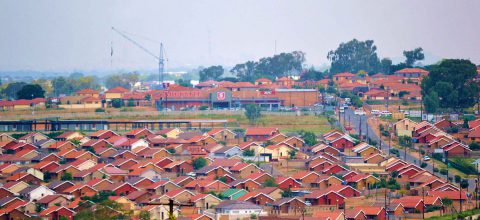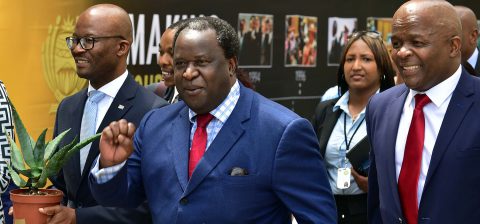Magazine Cover
Celebrating 20 Years Of Democracy
At the launch of the government’s 20-Year Review in March, President Jacob Zuma said that the country -had ‘a good story to tell’. The review reflects on South Africa’s progress in reconstruction and development since 1994, and the obstacles facing the country as it enters its third decade of democracy.
According to the results of Census 2011, income levels have increased compared to 1996, education levels are improving and millions of people now have access to water, electricity, sanitation and housing. For example, the number of households with access to piped water has increased from 80.3% in 1996 to 91.2% in 2011.
Zuma said much has been done to improve the lives of disadvantaged people through pro-poor economic interventions after inheriting a racially divided country in 1994. ‘The biggest barrier to further increasing social cohesion is the remaining inequality in society, which needs to be attended to further,’ Zuma said. ‘Looking ahead, we should commit to working together to implement the National Development Plan (NDP) to deal with the remaining challenges and take our country forward.’
A BETTER LIFE FOR ALL
Some of the tangible benefits of democracy, Zuma said, were social security programmes, subsidised housing and the extension of services such as electricity and water, quality education and health care. South Africans now enjoyed basic human rights that restored their dignity after the adoption of the Constitution in 1996. ‘Thanks to our progressive Constitution, we enjoy freedom of movement and of association, the right to own property, the right not to be detained without trial, freedom of expression and freedom of the press, religious freedom and freedom of sexual orientation,’ Zuma noted. On the subject of the economy, Zuma said that South Africa’s growth had averaged 3.2% from 1994 to 2012, ‘a marked improvement over pre-1994 growth rates’, while the number of people in employment grew by approximately 60%, or 5.6 million people, between 1994 and 2013.
Other major improvements could be seen in the spheres of education, health care and housing. For example, over eight million school children were now beneficiaries of no-fee schools, while nine million were being fed through school-feeding schemes, the review said. In addition to free basic healthcare, more than 1 500 healthcare facilities had been built and existing ones had been revitalised over the past 20 years.
‘One of the major challenges that confronted the democratic government was the rapid rise in the HIV epidemic,’ the president said. ‘The country’s improved response to HIV/Aids and TB has resulted in dramatic improvements in health outcomes.’
According to the 20-Year Review, the Reconstruction and Development Programme had resulted in about 2.8 million state-subsidised houses being built and over 875 000 serviced sites being delivered. This had given more than 12 million South Africans access to accommodation and increased the proportion of people living in formal housing from 64% in 1996 to 77% in 2011.
TRANSFORMATION OF LOCAL GOVERNMENT
Prior to the Constitution being adopted in 1996, local authorities were merely creatures of state and existed at the mercy of the provinces. All their actions, including the passing of by-laws, were subject to judicial review. The legacy of apartheid meant that municipalities were fragmented and racially segregated – massively unequal services were provided to different communities. The transformation of local government was aimed at removing the racial basis of government and making it a vehicle for the integration of society and the equitable redistribution of municipal services.
This process occurred in three distinct phases. The first, pre-interim phase began with the Local Government Transition Act in 1993, when negotiating forums in local authorities were established. The second phase commenced when the first local government elections were held in 1995/6, establishing integrated municipalities, although these were not yet fully democratically elected. The third and final phase started with the local government election in 2000, when the current local government system was established.
‘Local government entered a new era with the adoption of the Constitution,’ says Father Smangaliso Mkhatshwa, who served as SALGA national chairperson from 2000 to2006. ‘For the first time in our history, a wall-to-wall local government system was introduced.’
The Constitution outlined three categories of local government: single-tier Category A (metropolitan) municipalities and two-tier Category B (local) and Category C (district) municipalities. This was further augmented by the White Paper on Local Government in 1998, the cornerstone of which was developmental local government. This was defined as ‘local government committed to working with citizens and groups within the community to find sustainable ways to meet their social, economic and material needs and to improve the quality of their lives’.
For Father Mkhatshwa, who is also the former Mayor of Tshwane, the dawn of democracy has meant the ‘revitalisation of local government as the rightful third sphere of government’. He says the major focus for municipalities for the past 20 years has been on the delivery of services – water, roads, sanitation and electricity – but insists that ‘people’s needs go beyond that’. ‘Residents want to feel they have a say in the way in which they are governed,’ he says. ‘They want to be involved in the process of identifying priority needs.’
Under apartheid, a major city like Pretoria presented two faces, according to Father Mkhatshwa: ‘the white part of the city, which was well resourced, and the black townships, where service delivery was poor and economic activity was not encouraged’. He believes one of the most significant achievements of local government post-1994 has been the fairer redistribution of resources.
Deputy Speaker of Parliament Nomaindia Mfeketo concurs. A former SALGA chairperson as well as the Mayor of Cape Town from 2002 to 2006, Mfeketo says the biggest milestone for local government in the past two decades has been the establishment of the creed ‘one city, one tax base’. ‘This means that municipal services have been rolled out to every resident of a specific geographical area, regardless of their race,’ she says.
‘Access to services has been broadened, the economy has been stabilised and a non-racial society has begun to emerge,’ she continues. ‘Millions who were previously excluded have access to education, water, electricity, health care, housing and social security.’
’One city, One tax base’
The other two key milestones, according to Mfeketo, have been the establishment of the Municipal Demarcation Board (MDB) and the formation of a governance mechanism in the form of SALGA. Envisaged by the Constitution and created by the Municipal Demarcation Act in 1998, the MDB is an independent authority responsible for delimiting the boundaries of districts and municipalities, and the boundaries of the electoral wards within those municipalities.
‘The MDB’s role is a transformative one aimed at addressing the spatial legacy of our racially fragmented past,’ Mfeketo says. ‘The MDB has assisted in starting to reverse the apartheid spatial patterns. Redetermination of municipal boundaries has changed the face of local government, both in its economic outlook and its social posture.’
Another former SALGA chairperson and former Mayor of Johannesburg, Amos Masondo, agrees that having a single tax base has enabled cities to distribute resources in a more even-handed manner. ‘In the past, black people shopped in white areas, but received no benefit to their communities from the tax revenue collected in those areas,’ he says. ‘The idea of “one city, one tax base” was that the city collects taxes from all its residents and then uses that money to serve the entire city, maintaining the existingdeveloped areas, but at the same time uplifting the poorer areas of the city as well.’
As the sphere of government closest to the people, local government has an important role to play in participatory governance. ‘Embedded in the concept of wall-to-wall government is the issue of public participation,’ says Mfeketo. ‘Public participation in effect gives effect to the progressive realisation of the constitutional rights of citizens. The local sphere of government should be guided by the needs and activism of an empowered citizenry through Integrated Development Plans (IDPs).’ Collin Matjila, former chair of the Johannesburg Executive Committee and founding SALGA chairperson, believes that the provision of roads, transport, electricity, water and sanitation has changed the lives of ordinary communities significantly. ‘This has given meaning to the vision of “a better life for all”,’ he says. An example of this would be the Mkomaas River Bridge built in KwaZulu-Natal in 2008. ‘Whenever the river flooded, children attending the nearby school would be cut off and in some cases, drowned. The pedestrian bridge therefore enabled them to access education in a quick, safe manner.’
Matjila echoes the sentiments of Father Mkhatshwa that the three tiers of government should work more closely together. ‘The three spheres of government should not be thought of as separate,’ he says. ‘They share the same goal – developing our country in a sustainable way.’ He adds that provincial government should not have a ‘big brother, small brother’ relationship with its municipalities. ‘Instead, local governments should team up with provincial government for achieving a common purpose: for example, securing IT services for several towns at a favourable rate, or in the provision of housing, where local government provides the land, while provincial government provides the subsidies.’
THE ROAD AHEAD
Looking forward, Matjila believes that several key challenges remain, among them the need to build capacity at a local level and to minimise the use of expensive consultants, who should be the ‘exception rather than the norm’ in municipalities. He is confident that SALGA will continue to play a key role in integrating the three spheres of government and leveraging its skilled personnel to help embattled local authorities. ‘SALGA’s role goes beyond policy advocacy to implementation of the National Development Plan at a local level,’ he says.
Masondo points to the triple challenge of inequality, poverty and unemployment as the biggest hurdle for local government to overcome. But he adds that some of the problems we face are not unique to South Africa, but are rather global. ‘These problems include the burden placed on the state by immigration from neighbouring African countries and environmental issues, such as the protection of water sources, pollution and waste,’ he says.
Given the fact that councillors now have much more authority in their areas of jurisdiction than in the past, they should use this power to build a more dynamic relationship with their constituents, asserts Father Mkhatshwa. ‘Violent service delivery protests can be avoided if councillors make sure they are in daily contact with the people, listening to their grievances, holding public meetings and keeping residents informed of what is going on,’ he says.
The elimination of corruption, including improved monitoring and evaluation systems, is one of the major challenges facing local government, says Mfeketo. She is adamant that there needs to be a clearer separation between the political sphere and the work of administration. ‘We need to stabilise the political-administrative interface by building a professional public service that serves government, but is sufficiently autonomous to be insulated from political patronage,’ she says. Making local government a career of choice would also help to attract better skills, she adds.
She concludes: ‘The mandate of developmental local government extends beyond basic service delivery and infrastructure development. Municipalities are now expected to lead society in the building of cohesive local communities as microcosms of greater society – the rainbow nation of South Africa.’





 Sign-up and receive the Business Media MAGS newsletter OR SA Mining newsletter straight to your inbox.
Sign-up and receive the Business Media MAGS newsletter OR SA Mining newsletter straight to your inbox.